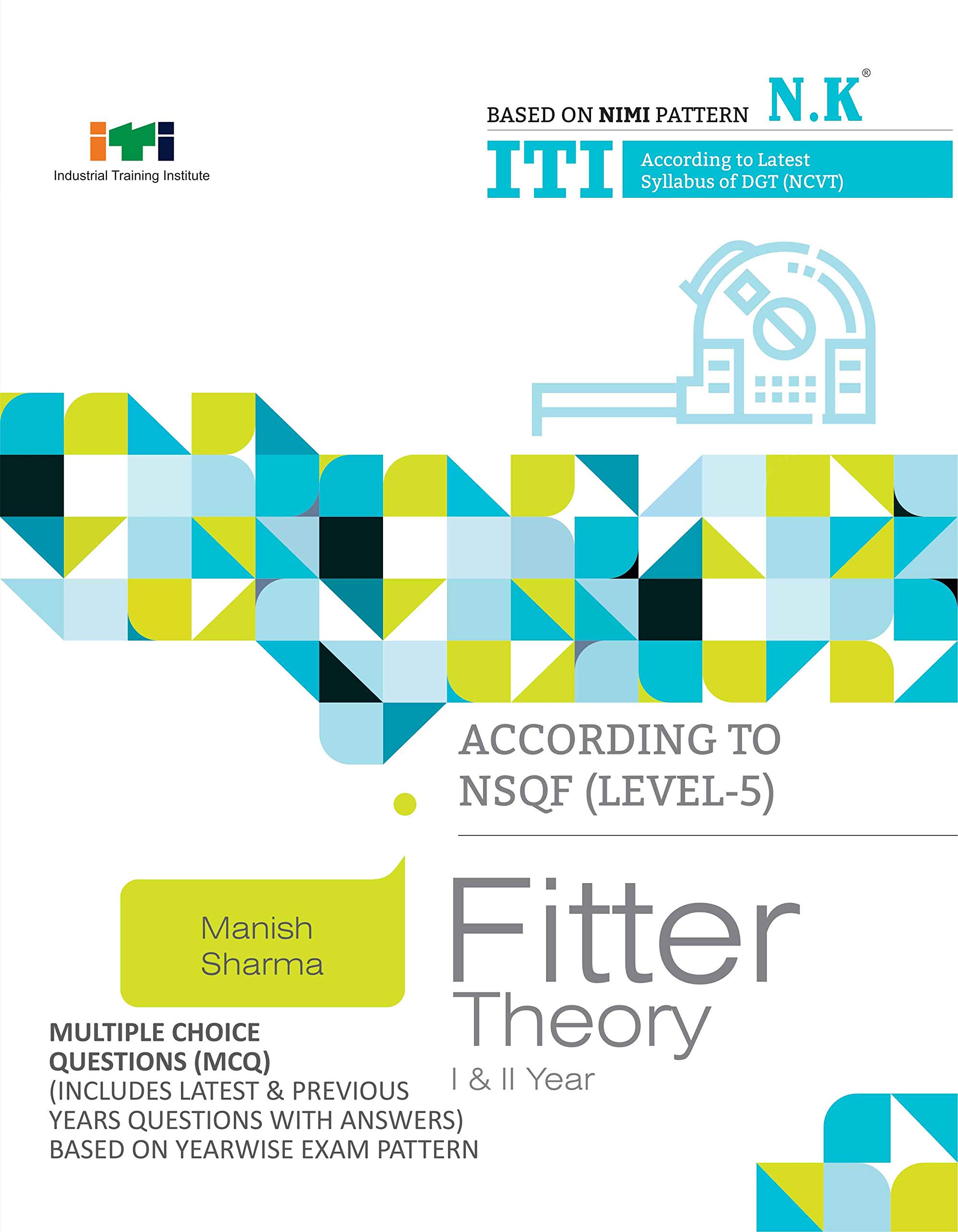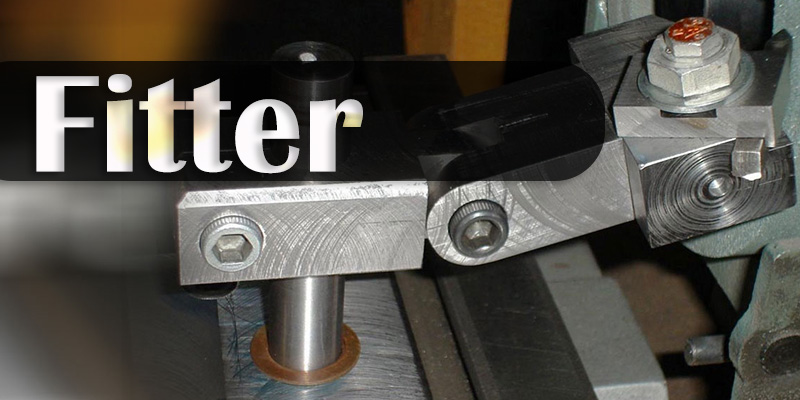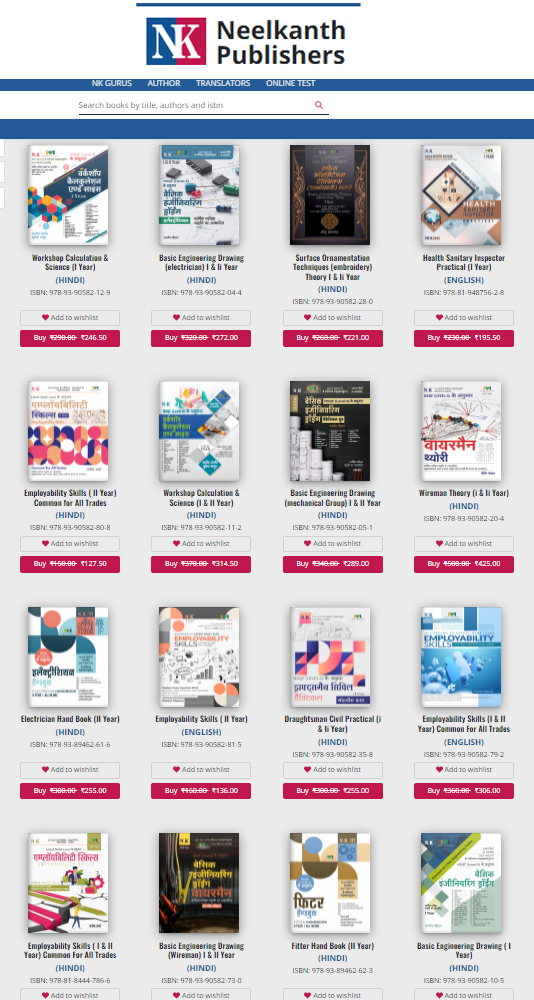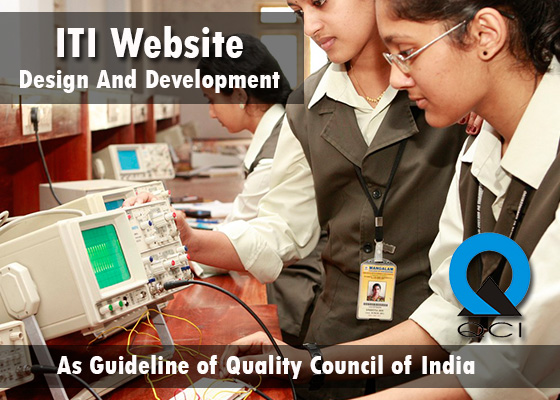Fitter Theory Books I, II Year

according to latest syllabus of DGT(NCVT).
Trade Basics (Fitter)
- Industrial Training Institutes (ITIs)
- Fitter
Occupational Safety and First Aid
- Occupational Safety and Health
- Importance of Occupational Safety and Health
- Accidents at Workplace
- Safety
- Personal Protective Equipment (PPE)
- First Aid
- Elementary First Aid
- Lifting and Handling Load
- 5’S Concept
- Response to Emergencies
- Fire
- Soft Skills
Foundryman Technician Theory
- Importance of occupational safety and health
- Accidents at work place
- Safety precautions while using hand tools
- Fire
- Causes of fire in workshop and safety planning
- Storage of inflammable materials
- First aid
- Lifting and handling load
- Types of injuries and preventions
- Kinetic method of lifting load
- Correct manual lifting techniques
- Lowering the load
- 5’S concept
- Personal protective equipments
- Respiratory protection
- Points to be remembered for respiratory protective equipments
- Limitations of personal protective equipments
- Technical emergency
- Power failure
- Protection of body
- Hand and arm protection
- Legs protection
- Common safety precautions used in foundry shop
- Soft skills
Measurement and Measuring Instruments
- Methods of Measurements
- Units of Measurements
- Non-precision Instruments
- Precision Measuring Instruments
- Errors in Measurement
Marking Tools
- Marking Media
- Methods of Marking
- Marking or Layout Table
- Surface Plate
- Angle Plate
- Scriber
- Divider
- Trammel
- Parallel Block
- Scriber Block/Surface Gauge
- V-block
- Marking Punch
Cutting Tools
- File
- Hacksaw
- Chisel
- Drill
- Saw
Striking and Holding Tools
- Hammer
- Holding Tools
Metals
- Properties of Metals
- Iron
- Types of Metals
- Differences between Ferrous and Non-ferrous Metals
- Non-ferrous Alloys
Heat Treatment
- Types of Steel Structures
- Structure of Steel when Heated
- Critical Temperature
- Three Stages of Heat Treatment
- Methods of Heat Treatment
Fitter Theory
- Types of Steel Structures
- Structure of Steel when Heated
- Critical Temperature
- Three Stages of Heat Treatment
- Methods of Heat Treatment
- Hardening Method of High Speed Steel
- Various Methods of Hardness Test
Forging
- Classification of Forging
- Forge
- Forging Tools
- Fuels used for Forging
- Forging Operations
- Advantages of Forging
- Disadvantages of Forging
Sheet Metal Work
- Safety Precautions
- Types of Metal Sheets
- Prevention of Sheet Metal from Corrosion
- Sheet Metal Tools
- Stake
- Seam
- Hand Groover
- Notches
- Hem
- Folding and Jointing Allowance
- Sheet Metal Operations
Soldering
- Solder
- Soldering Procedure
- Flux
- Brazing
Rivet
- Types of Rivet Head
- Rivet Designation
- The Size of Rivet Hole
- Definitions used in Riveted Joints
- Riveted Joints
- Riveting Tools
- Special Rivets
- Rivet Spacing in Rivet Joints
- Rivet Pitch
- Caulking and Fullering
- Defects in Riveted Joints
- Methods of Riveting
- Flush Riveting
Welding
- Classification of Welding
- Electric Arc Welding
- Electrode
- Oxy-acetylene Gas Welding
- Oxy-acetylene Gas Cutting
- CO2 Welding
- Welding Joints
- Welding Defects
- Symbols Used while Welding
- Advantages and Uses of Welding
- Safety Precautions in Welding Workshop
Operations
- Drills
- Counter Sinking
- Counter Boring
- Spot Facing
- Reamers
- Screw Pitch Gauge
- Taps
- Die
- Blank Size for External Threading
- Removal of Broken Tap
- Removal of Broken Stud or Screw
- Scrapers
Screw Threads
- Elements of Screw Thread
- Terminology Used
- Classification of Screw Threads
- Applications of Screw Threads
Grinding
- Types of Grinding Operations
- Grinding Machines
- Grinding Wheel
- Mounting of Grinding Wheels
- Loading of the Wheel
- Glazing of Wheel
- Off-bench Abrasion
- Wheel Dresser
- Dressing and Truing
- General Grinding Defects and Their Remedies
Gauges
- Gauges
- Types of Gauges
- Sine Bar
Limit Fit and Tolerance
- Interchangeability and Mass Production
- Factors Affecting Interchangeability
- Reading of Standard Chart in the BIS System of Limits and Fits
- Fits and their Classification as per the Indian Standard
- ISI System for Limits and Fits
Assembling Techniques
- Mechanical Joints
- Sealing
- Bending
- Fixing
- Torquing
- Aligning
- Causes and Prevention of Assembly Failure
- Preventive Maintenance of Machines and their Assemblies
- Lubrication of Assemblies
- Simple Estimation of Materials used in Assemblies
Mechanical Fasteners
- Key
- Taper Pin or Key
- Bolt
- Nut
- Washer
- Screws
- Locking Arrangement of Nuts
Engineering Drawing Mechanical
- Key
- Circlips
- Set Collars
- Taper Pins
- Cotter
- Use of Pins in Connecting Shafts
- Flange Coupling
- Muff Coupling
- Bearings
Lathe Machine
- Working Principle of a Lathe Machine
- Types of Lathe Machine
- Parts of the Lathe Machine
- Specifications of a Lathe Machine
- Accessories of a Lathe Machine
- Cutting Tools
- Lathe Operations
- Alignment of Lathe Machine Centers
- Feed Mechanism of Lathe Machine
- Cutting speed and feed
- Cutting Fluids and their uses
Surface Finish
- Terminology Used in Surface Finish
- Surface Quality
- Measurement of Surface Roughness
- Surface Roughness Expected from Manufacturing Process
- Surface Finish Standard
- Methods of Indicating Surface Roughness
- Methods of Measuring Surface Finish
- Lapping
- Honing
- Frosting
- Scraping
- Quality Control
Bearings
- Composition Materials for Bearings
- Types of Bearing
- Bearing Housing, Bedding and Loading
- Re-Filling Process of Shell Bearing
- Mounting and Dismounting of Ball or Rolling Bearing
- Main Reasons of Faults in Bearing and Precautions
- Lubrication in Bearings
Jigs and Fixtures
- Advantages of Jigs and Fixtures
- Differences Between Jigs and Fixtures
- Design Consideration of Jigs and Fixtures
- Types of Jigs
- Types of Drilling Jigs
- Jig Bushes
- Fixtures
- Elements of Jigs and Fixtures
- Gauges and Templates
Pipe Fitting
- Types of Pipe
- Sizes of Pipe
- Pipe Schedule
- Pipe Fittings
- Pipe Fitting Tools
- Pipe Fitting Operations
- Repairing Components
- Household Water Tap Repair
- Repairing a dripping Tap
- Valve
- Pipe Threads
Fire
- Causes of Fire
- Types of Fire
- Fire Fighting Equipments
- Fire Safety Precautions
Surface Coating
- Working Materials
- Electroplating
- Galvanizing
- Electroforming
- Organic Coating
Belt Rope and Chain Drives
- Belt Drives
- Types of Belts
- Materials used for belts
- Selection of a Belt Drive
- Belt Tensioning Methods
- Types of Flat Belt Drive
- Belt Fastening
- Velocity Ratio
- Slip of Belt
- Creep of Belt
- Dressing of Belt
- Rope Drive
- Chain Drives
Pulley and Coupling
- Belt Drives
- Functions of Coupling
- Types of Coupling
- Pulley
- Types of Pulley
Gears and Clutches
- Clutch
- Principle of Clutch
- Types of Clutch
- Gear
- Terminology used in Gears
- Classification of Gears
- Types of Gear Tooth Failures
- Methods of Repairing the broken Gear Teeth
- Gear Train
- Care and Maintenance of Gears
Lubricants
- Types of Lubricants
- Properties of Lubricants
- Principles of Lubrication
- Methods of Lubrication
- Important Points to Note in a Machine Lubrication
- Selection of Lubrication
- Coolant
- Emulsion
Technical Terms Used Industry
- Definition of Some Technical Terms
- Technical Forms
- Process Charts
- Cycle Time
- Productivity Reports
- Estimation
- Job Cards
Installation Maintenance and Overhauling
- Installation of Machines
- Maintenance of Machines
- Overhauling of Machines
- Hydraulic and Pneumatic Symbols
Foundation Devices
- Washers
- Lifting Devices
- Extractor Press
- Mechanical Advantage
- Handling of Heavy Machinery
- Special Precautions in the Removal and Replacement of Heavy Parts
- Foundation Bolts
- Pulley Block
- Crowbar
- Spirit Level
- Plum Bob
- Pipe 2×4
- Wire Rope
ITI Book Fitter Theory Books I, II Year is by [node:field_author]. Fitter Theory Books I, II Year is according to Latest NSQF Level. Fitter Theory Books I, II Year is according to latest syllabus of DGT(NCVT). Fitter Theory Books I, II Year is for I Year, II Year. Fitter Theory Books I, II Year is for ITI trade Fitter . Fitter Theory Books I, II Year have fundamental topic Trade Basics (Fitter), Occupational Safety and First Aid, Measurement and Measuring Instruments, Marking Tools, Cutting Tools, Striking and Holding Tools, Metals, Heat Treatment, Forging, Sheet Metal Work, Soldering, Rivet, Welding, Operations, Screw Threads, Grinding, Gauges, Limit Fit and Tolerance, Assembling Techniques, Mechanical Fasteners, Lathe Machine, Surface Finish, Bearings, Jigs and Fixtures, Pipe Fitting, Fire, Surface Coating, Belt Rope and Chain Drives, Pulley and Coupling, Gears and Clutches, Lubricants, Technical Terms Used Industry, Installation Maintenance and Overhauling, Foundation Devices
Fitter

ITI trade Fitter is powered by NCVT. ITI trade Fitter is a job oriented trade ITI trade Fitter is suitable for government job and private job. This ITI trade Fitter is very powerful for self-empowerment. This ITI trade Fitter is perfectly design to fulfill industrial requirement of Indian Industries as well as International industries.
Fitters have a wide scope of Employability ranging from self-employment, contractual employment to Industrial jobs. On successful completion of this course, the candidates shall be gainfully employed in the following industries:
- Production & Manufacturing industries.
- Structural Fabrication like bridges, Roof structures, Building & construction.
- Automobile and allied industries
- Service industries like road transportation and Railways.
- Ship building and repair
- Infrastructure and defence organizations
- In public sector industries like BHEL, BEML, NTPC, etc and private industries in India & abroad.
- Self employment
International Comparability
- Existence of any official document suggesting the comparability of the qualification with the qualifications in other countries is not known.
- However, ITI passed out trainees are getting employment in many Gulf countries, European countries, Australia, New Zealand, Singapore etc.
Progression Pathway
- Can appear in 10+2 examination through National Institute of Open Schooling (NIOS) for acquiring higher secondary certificate and can go further for General/ Technical education
- Can take admission in diploma course in notified branches of Engineering by lateral entry
- Can join as semi-skilled worker in the industry and can become supervisor after doing part-time diploma in relevant branch of Engineering
- Can join Apprenticeship programme in different types of industries leading to National Apprenticeship certificate (NAC) after which they will be employed in industry as skilled worker and can become supervisor after doing part-time diploma in relevant branch of Engineering
- Can join Crafts Instructor Training Scheme (CITS) in the relevant trade after which they will be employed in ITI/ Vocational Training Institute as instructor
Neelkanth Publishers

Welcome to Neelkanth Publishers or NK as it is popularly known. In the last ten years, we have published more than 1100 titles and editions of text books, solved question papers in different segments including Engineering, ITI,Polytechnic and Skill Development. We believe in making quality books which are easy to understand, have lucid language and have simple and attractive illustrations. Our authors include some of the most well-known names in their respective fields. Though are books are prepared after painstaking and extensive research with numerous revisions for language and content, yet they are affordable for the masses and hence are popular in the entire country.
https://neelkanthpublishers.com/
ITI text and hand books
Trade Basics
Industrial Training Institutes (ITIs)
Fitter
Occupational Safety and First Aid
Occupational Safety and Health
Importance of Occupational Safety and Health
Accidents at Workplace
Safety
Personal Protective Equipment (PPE)
First Aid
Elementary First Aid
Lifting and Handling Load
5’S Concept
Response to Emergencies
Fire
Soft Skills
Measurement and Measuring Instruments
Methods of Measurements
Units of Measurements
Non-precision Instruments
Precision Measuring Instruments
Errors in Measurement
Marking Tools
Marking Media
Methods of Marking
Marking or Layout Table
Surface Plate
Angle Plate
Scriber
Divider
Trammel
Parallel Block
Scriber Block/Surface Gauge
V-block
Marking Punch
Cutting Tools
File
Hacksaw
Chisel
Drill
Saw
Striking and Holding Tools
Hammer
Holding Tools
Metals
Properties of Metals
Iron
Types of Metals
Differences between Ferrous and Non-ferrous Metals
Non-ferrous Alloys
Heat Treatment
Types of Steel Structures
Structure of Steel when Heated
Critical Temperature
Three Stages of Heat Treatment
Methods of Heat Treatment
Hardening Method of High Speed Steel
Various Methods of Hardness Test
Forging
Classification of Forging
Forge
Forging Tools
Fuels used for Forging
Forging Operations
Advantages of Forging
Disadvantages of Forging
Sheet Metal Work
Safety Precautions
Types of Metal Sheets
Prevention of Sheet Metal from Corrosion
Sheet Metal Tools
Stake
Seam
Hand Groover
Notches
Hem
Folding and Jointing Allowance
Sheet Metal Operations
Soldering
Solder
Soldering Procedure
Flux
Brazing
Rivet
Types of Rivet Head
Rivet Designation
The Size of Rivet Hole
Definitions used in Riveted Joints
Riveted Joints
Riveting Tools
Special Rivets
Rivet Spacing in Rivet Joints
Rivet Pitch
Caulking and Fullering
Defects in Riveted Joints
Methods of Riveting
Flush Riveting
Welding
Classification of Welding
Electric Arc Welding
Electrode
Oxy-acetylene Gas Welding
Oxy-acetylene Gas Cutting
CO2 Welding
Welding Joints
Welding Defects
Symbols Used while Welding
Advantages and Uses of Welding
Safety Precautions in Welding Workshop
Operations
Drills
Counter Sinking
Counter Boring
Spot Facing
Reamers
Screw Pitch Gauge
Taps
Die
Blank Size for External Threading
Removal of Broken Tap
Removal of Broken Stud or Screw
Scrapers
Screw Threads
Elements of Screw Thread
Classification of Screw Threads
Applications of Screw Threads
Grinding
Types of Grinding Operations
Grinding Machines
Grinding Wheel
Mounting of Grinding Wheels
Loading of the Wheel
Glazing of Wheel
Off-bench Abrasion
Wheel Dresser
Dressing and Truing
General Grinding Defects and Their Remedies
Gauges
Gauges
Types of Gauges
Sine Bar
Limit, Fit and Tolerance
Interchangeability and Mass Production
Factors Affecting Interchangeability
Reading of Standard Chart in the BIS System of Limits and Fits
Fits and their Classification as per the Indian Standard
ISI System for Limits and Fits
Assembling Techniques
Mechanical Joints
Sealing
Bending
Fixing
Torquing
Aligning
Causes and Prevention of Assembly Failure
Preventive Maintenance of Machines and their Assemblies
Lubrication of Assemblies
Simple Estimation of Materials used in Assemblies
Mechanical Fasteners
Key
Taper Pin or Key
Bolt
Nut
Washer
Screws
Locking Arrangement of Nuts
Lathe Machine
Working Principle of a Lathe Machine
Types of Lathe Machine
Parts of the Lathe Machine
Specifications of a Lathe Machine
Accessories of a Lathe Machine
Cutting Tools
Lathe Operations
Alignment of Lathe Machine Centers
Feed Mechanism of Lathe Machine
Cutting speed and feed
Cutting Fluids and their uses
Surface Finish
Terminology Used in Surface Finish
Surface Quality
Measurement of Surface Roughness
Surface Roughness Expected from Manufacturing Process
Surface Finish Standard
Methods of Indicating Surface Roughness
Methods of Measuring Surface Finish
Lapping
Honing
Frosting
Scraping
Quality Control
Bearings
Composition Materials for Bearings
Types of Bearing
Bearing Housing, Bedding and Loading
Re-Filling Process of Shell Bearing
Mounting and Dismounting of Ball or Rolling Bearing
Main Reasons of Faults in Bearing and Precautions
Lubrication in Bearings
Jigs and Fixtures
Advantages of Jigs and Fixtures
Differences Between Jigs and Fixtures
Design Consideration of Jigs and Fixtures
Types of Jigs
Types of Drilling Jigs
Jig Bushes
Fixtures
Elements of Jigs and Fixtures
Gauges and Templates
Pipe Fitting
Types of Pipe
Sizes of Pipe
Pipe Schedule
Pipe Fittings
Pipe Fitting Tools
Pipe Fitting Operations
Repairing Components
Household Water Tap Repair
Repairing a dripping Tap
Valve
Pipe Threads
Fire
Causes of Fire
Types of Fire
Fire Fighting Equipments
Fire Safety Precautions
Surface Coating
Working Materials
Electroplating
Galvanizing
Electroforming
Organic Coating
Belt, Rope and Chain Drives
Belt Drives
Types of Belts
Materials used for belts
Selection of a Belt Drive
Belt Tensioning Methods
Types of Flat Belt Drive
Belt Fastening
Velocity Ratio
Slip of Belt
Creep of Belt
Dressing of Belt
Rope Drive
Chain Drives
Pulley and Coupling
Belt Drives
Functions of Coupling
Types of Coupling
Pulley
Types of Pulley
Gears and Clutches
Clutch
Principle of Clutch
Types of Clutch
Gear
Terminology used in Gears
Classification of Gears
Types of Gear Tooth Failures
Methods of Repairing the broken Gear Teeth
Gear Train
Care and Maintenance of Gears
Lubricants
Types of Lubricants
Properties of Lubricants
Principles of Lubrication
Methods of Lubrication
Important Points to Note in a Machine Lubrication
Selection of Lubrication
Coolant
Emulsion
Technical Terms Used Industry
Definition of Some Technical Terms
Technical Forms
Process Charts
Cycle Time
Productivity Reports
Estimation
Job Cards
Installation, Maintenance and Overhauling
Installation of Machines
Maintenance of Machines
Overhauling of Machines
Hydraulic and Pneumatic Symbols
Foundation Devices
Washers
Lifting Devices
Extractor Press
Mechanical Advantage
Handling of Heavy Machinery
Special Precautions in the Removal and Replacement of Heavy Parts
Foundation Bolts
Pulley Block
Crowbar
Spirit Level
Plum Bob
Pipe 2×4
Wire Rope
ITI Student Resume Portal
रिज्यूम पोर्टल का मुख्य उद्देश्य योग्य छात्रों की जानकारी सार्वजनिक पटल पर लाने की है जिससे जिन्हें आवश्यकता हो वह अपने सुविधा अनुसार छात्रों का चयन कर सकते हैं

